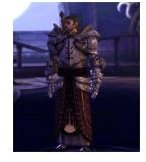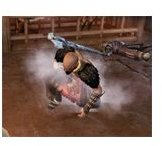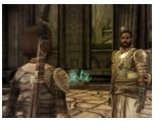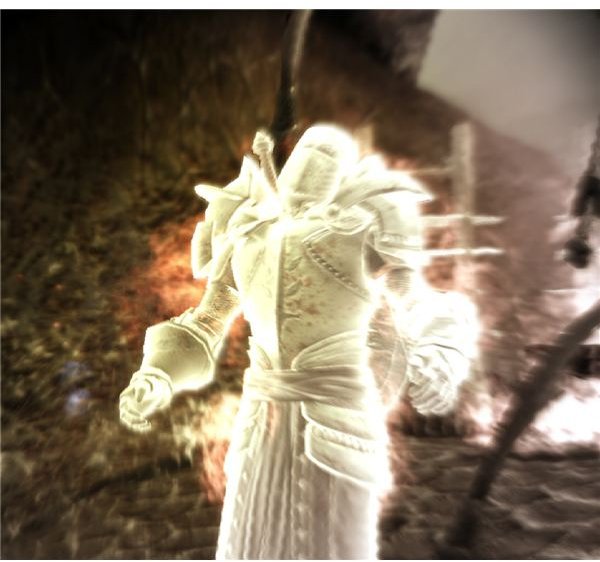Dragon Age Templar Build Guide: Being a Good or Evil Templar in DAO

Being a Templar
The templar in Dragon Age Origins is an interesting warrior class. It is designed for one purpose only: to go after enemy spellcasters. All the talents and bonuses gained by the templar help him or her better survive attacks by mages and do damage to them physically and mentally. Templars can also dispel magical effects, and have a very powerful area of effect spell that can affect multiple enemies at once.
So the templar is good for a character who is willing to be flexible, to go after spellcasters when they’re there and revert to another set of tactics when facing more mundane foes. Templars make pretty good tanks and support players, and tend to survive for a long time due to their high mental resistance (after all, spellcasters do more damage than almost any other kind of character). So if this sounds like the kind of warrior you’d like to create, or if you already have a templar, read on to find out the advantages of the templar specialization and strategies for using it.
Dragon Age Origins Templar Talents and Benefits
The templar gains a permanent +2 to magic and +3 to mental resistance, as well as the following tree of new warrior talents.

Righteous Strike: This is a passive talent—once learned it is permanent. With Righteous Strike, when the templar attacks an enemy mage each successful hit drains the mage’s mana as well as doing damage. This allows the templar to neutralize enemy spellcasters more quickly, depriving them of their ability to do damage.
Cleanse Area: When activated, all magical effects on those nearby are dispelled. This effects enemies and allies alike. This talent has multiple uses—you can use it to dispel buffs and other spells enemies have cast on themselves, or you can dispel harmful spells cast on your party members. (Or with good timing you could do both).
Mental Fortess: This passive talent permanatly increases the templar’s mental resistance. That way, he or she can go up against enemy mages without being in as much danger of being neutralized by magic.
Holy Smite: This powerful spell has a number of effects. When cast, this talent releases magical fire that inflicts damage on nearby foes and has a chance to stun them or knock them down. Also, if cast against a mage the enemy spellcaster has to pass a mental resistance check, and if that fails takes extra damage and a penalty to mana. This talent can be a lifesaver, particularly against powerful mages.
How to Unlock the Templar
There are two simple ways to unlock the templar specialization. The first is by learning it from Alistair, once you’ve gotten his approval rating fairly high. The other is by buying the templar manual from the merchant in your party camp.
Specialization Combinations
Now that you’re a templar, you’ll need to choose a second specialization. Alternately, you might already have one specialization and are wondering if templar would make a good second choice. Some combinations are better than others, and each is quite different. So here’s what the templar looks combined with the three other possible specializations.

Templar + Champion: This is an excellent build and produces a very good tank/support fighter. Both specializations focus not on overall damage but on defense and support to allies. The champion/templar has the ability to be flexible, by switching between going after enemy mages and drawing the attention of groups of enemies away from the rest of the party. And with both Holy Smite and Superiority, it’s possible to keep large numbers of the enemy out of commission for much of the battle.
Templar + Berserker: An interesting combination, templar and berserker don’t exactly compliment each other but they aren’t terrible together either. Templar focuses on area of effect and fighting mages, while berserker focuses on damage and one-on-one fights. So you’re able to handle a large number of challenges fairly well, but you aren’t going to be really good at any one thing (except doing a whole lot of damage to mages). You’ll want to bring a lot of potions, though, since neither of these specializations help you out much with defense (again, except against mages).
Templar + Reaver: This is far from the most balanced combination. You’ll be able to handle mages and large groups, but you won’t be much use one-on-one. Plus, both these specializations take a lot of damage, so it’s hard to keep the templar/reaver alive for long. It’s possible to use this build strategically to do a lot of damage, but not recommended.
Tips for Maximizing your Templar
Stats: High Strength is important, to help the templar survive encounters with enemy spellcasters. As with all warriors, the templar will want to put some points into both Constitution and Dexterity. Finally, you’ll want to spend some points on Willpower, since that attribute determines the effectiveness of Holy Smite (the talent that really makes this specialization worth it).

Combat Strategy: This isn’t hard—the number one thing any templar should do is go straight for any enemy spellcasters. Try to take them out quickly, since mages do a lot of damage but usually don’t have a lot of defense. If there are no spellcasters among the enemy, or the spellcasters are all dead, the templar can revert to being a normal warrior. Templars make fairly good tanks, since when surrounded by a lot of enemies they can use Holy Smite to damage and/or incapacitate most of them. No matter what kind of enemy you’re fighting, however, keep an eye on the overall battle and use Cleanse Area strategically to dispel enemy spells and curses placed on your party members. Just be careful not to dispel a curse placed on an enemy, or a beneficial spell cast on a party member.
This post is part of the series: Dragon Age Origins Warrior Specialization Guide
Trying to build a powerful warrior in Dragon Age Origins? In this series you’ll find everything you need to know about your four specialization choices—reaver, berserker, champion, and templar—and how to use and combine them effectively.
